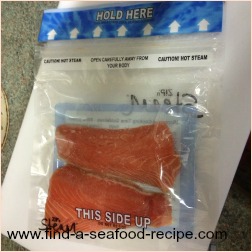- Home
- Easy Seafood Recipes
- Microwaving Fish
Microwaving Fish
As an Amazon Associate I earn from qualifying purchases.

Microwaving fish is simple, super fast and the nutrients are retained. This article from Harvard Medical School outlines the reasons - mainly because it's quick, fewer nutrients are lost than through conventional cooking.
The method is a combination of cooking and steaming, which leaves your fish tender and succulent.
An average fillet (around 5 oz, 125g) will take two minutes cooking on high and one minute steaming. It will keep hot for a few minutes so long as you don't take it out of the cooking dish.
There are some simple tips that will be of use to you.
|
Cook's Notes
|
Microwaving Fish in a bag
This is my favourite method as it means I can cook the fish and quickly throw away the steaming bag, getting rid of the fishy smell from the kitchen.
You can get these bags from most stores, but if you have any problems, then try Amazon where you can compare prices and quality side by side.
Do be cautious - my bags recommended four minutes for two fillets, but I found that they came out a bit dry for my liking. If you reduce the cooking by one minute and allow to steam for one more minute or even a bit longer, the fish will continue to cook and retain moisture rather than overcook.

This recipe is for Microwave Salmon and there are step by step instructions with photos.
You can see there are two tasty tail ends of salmon in that bag (my favourite cut as it's boneless).
It was absolutely delicious. I must confess that I forgot to take a photo before I ate it! Hey ho.
Microwaving Fish - Cod

Microwaved Cod makes a quick meal.
This recipe gives instructions for using a covered dish if you don't have steaming bags (or don't want to add to plastic waste)
Any microwave proof dish with a well fitted lid will do.
It's not necessary to have special equipment - something like a Pyrex dish is perfect.

Microwaved trout fillets - this is fit for a dinner party.
You can cook any fish like this - if you're making a meal for more than two people, have a warmed serving dish ready to take the first two fillets while you cook the other two.
|
Cook's Notes Refer to your handbook which came with your microwave for timings. They differ according to their power. Main thing: undercook rather than overcook. The fish will continue to cook after you remove it from the microwave. If it's opaque and firm to the touch, it's done. You can always give the fish a bit *more* cooking time, but you will never be able to give it any *less*. Too much cooking and your fish could be dry and tough. Too little and you can give it another blast in the microwave until it's done to your liking. |
Defrosting Fish
Personally, I don't use a microwave to defrost fish. It can be done, but you'll find little hot spots round the edges and icy bits in the middle. The result would be a very mixed fillet with some overcooked and some 'just right'.
If your microwave has a defrost setting, then you can give it a go if you want to.
However, fish fillets defrost really quickly in cold water. Generally, ten minutes or so will have your fish flexible with the majority of the ice crystals having dissolved. You'll be able to have them ready to cook within half an hour at the most in my experience.
Getting rid of fish smells from your microwave

There's no doubt about it, cooking fish can leave a smell. It can be awful and many people are put off by it.
This page gives you step by step instructions with photos as to how to get rid of the fish smells from your microwave.
Before you click through, can I say 'don't judge'. It's my microwave and I'd put a dish of beans in there without a lid. You can guess the rest... but the method cleans the microwave as well as getting rid of the smell!
Some of the links on this site include affiliate links, providing Find-a-Seafood-Recipe a small percentage of the sale at no additional cost to you.
Subscribe to Seafood Recipe News - complete the form below.
Your email address is secure and will *only* be used to send Seafood Recipe News. When you confirm your subscription, you will be taken to a page where you can access your free eCourse. Complete the form and it will arrive over the following five days.


